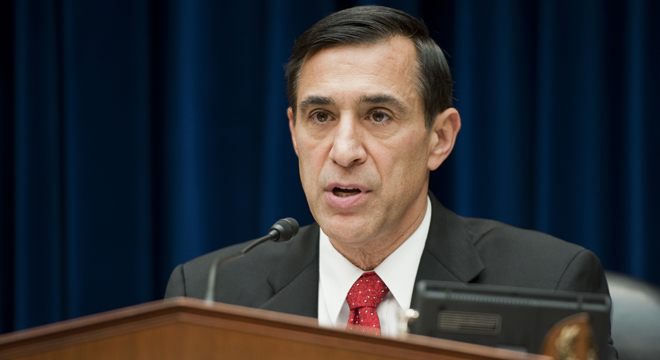A year after floating the idea, House Oversight Committee Chairman Rep. Darrell Issa made a big move Thursday by releasing a draft contempt resolution against Attorney General Eric Holder, claiming the Justice Department hasn’t cooperated with his congressional investigation into the flawed ATF operation known as “Fast and Furious.”
But several experts in congressional contempt proceedings told TPM that Issa’s move is mostly a problem of political perception for Holder. Legal consequences, should the House pass the contempt resolution, would take years to sort out.
Issa’s draft contempt resolution contends that the Justice Department hasn’t cooperated fully with the investigation, arguing its been slow to turn over documents, that the committee requested via subpoena, on the operation that let guns “walk” into the hands of Mexican drug cartels.
DOJ responded to Issa’s draft resolution with a strongly worded letter from Deputy Attorney General James Cole, who wrote that DOJ officials “continue to believe that efforts to arrive at a mutually acceptable resolution have not been fully exhausted.”
Issa’s committee, Cole wrote, “has not taken sufficient steps to define the categories of documents it deems essential to its review of Fast and Furious and its decision to issue a draft contempt citation appears to express a preference for confrontation over resolution.”
Congress has pursued contempt resolutions against members of the executive branch in the past, but they aren’t common. Most recently, Democrats on the House Judiciary Committee in 2008 began contempt proceedings against Bush administration officials Karl Rove and Harriet Miers.
“It’s pretty rare to have executive branch officers to be held in contempt of Congress,” law professor Josh Chafetz told TPM. “Usually these kind of disputes wind up getting settled through negotiations before it ever comes to a contempt citation.”
Stan Brand told TPM that Holder really shouldn’t be worried because of how cumbersome the contempt process can get, describing contempt proceedings as “mostly for show” and a “circus event.” The House would have to vote before it pursued civil remedies in court.
“I can’t really take it seriously because as you know for the last 30 years the Justice Department — both Republicans and Democrats — has taken the position that you can’t enforce the contempt statute against members of the executive branch who assert privilege or some other defense to the subpoenas,” Brand said.
“I wouldn’t be [worried] if I were advising the Attorney General, I’d say read the precedents and go about your business. Don’t worry about it, it’ll be 2014 before this gets resolved,” Brand said.
Chafetz, who described himself as a “big partisan for congressional power,” said DOJ should turn over more information but believes the issue will be settled via negotiation rather than in court.
“My general sense is that the executive owes Congress quite a lot of information, especially here where you have the executive engaging in highly questionable tactics,” Chafetz said. “Here you have government officials saying ‘well we know they’re running guns but we’re going to sit back and see what happens’ — there may be good reasons for that, there may not, but it certainly falls well within Congress’ oversight to be able to ask ‘what were you thinking?'”
Former Clinton-era Justice Department official Robert Raben believes Issa is more interested in grabbing headlines than leading a legitimate inquiry.
“Chairman Issa appears to be in the tradition of Congressman Burton, which is aggression and volume over facts,” Raben told TPM. “It feels like from what I observe, there’s a lot more conversation that can occur between the committee and the Department before you really get to a point where you say someone is in contempt of Congress for not complying.”
Raben said that Issa’s announcement of his intention to pursue a contempt resolution at the NRA convention showed it was about partisanship.
“This is, in my opinion from observing it for years, 400 percent politics, 5 percent legitimate oversight interested in protecting the well-functioning of the Department of Justice,” Raben said. “I’ve been watching him for three years and he is unnaturally hostile and aggressive towards this Attorney General.”
Chafetz said partisan motivations aren’t necessarily a bad thing.
“Politics has always played a major role in these things, and I think rightly so,” Chafetz said. “Part of what we want Congress in its oversight function to do is to have incentives to keep tabs on the executive branch, and partisan politics is a good incentive.”






